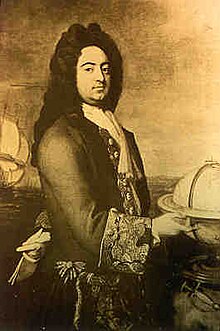Francis Nicholson
Francis Nicholson (born November 12, 1655 in Downholme , Yorkshire , England , † March 16, 1727 according to the Gregorian calendar in London , England) was between 1688 and 1725, with interruptions, English and British colonial governor of various American colonies.
Life
Not much is known about Francis Nicholson's origins. After an elementary school education of which we only know from one of his later letters, he became a page with Charles Paulet , the first Duke of Bolton . Since 1678 he was active in the English military service. At the beginning of the 1680s he was stationed as a lieutenant in Tangier , then England . He then returned to England. After the founding of the Dominion of New England in 1686, he was transferred to Boston , now as a captain , where he commanded an infantry unit. Barely two years later, he rose to be the deputy of Edmund Andros , governor of the Dominion, and was considered his possible successor. The Dominion comprised the present-day US states of Maine , New Hampshire , Vermont , Massachusetts , Rhode Island , Connecticut , New York and New Jersey and was clearly too large as an administrative unit.
After the Glorious Revolution and the ousting of King James II , the Dominion collapsed and the previous colonial structure was restored soon thereafter. There were riots in Boston and other parts of the region. Andros, who was hated by the people, was arrested and imprisoned in Boston. In the province of New York the uprisings turned into the so-called Leisler Rebellion . Nicholson, who was then in New York, fled to England. There he was from the new King Wilhelm III. Appointed Lieutenant Governor of the Colony of Virginia . He was Deputy Governor Francis Howard . During his temporary absence, he held the office of governor there. Nicholson remained in office as Lieutenant Governor of Virginia until 1692. He was also instrumental in founding the College of William & Mary . He also worked on improving the defense through a better positioned militia. He also campaigned for the construction of more ports. In 1692, Francis Nicholson was hoping to be appointed governor of Virginia. The former governor of New York and the Dominions of New England , Edmund Andros, who claimed this post in London and then received it, stood in his way. This resulted in enmity between the two men.
Nicholson then returned to England. In 1694 he was named the new governor of the province of Maryland . He was to hold this office until 1699. Here there was another conflict with Andros, who had meanwhile co-administered Maryland and left empty coffers there. Nicholson sued Andros and in 1696 he had to repay Maryland a sum of £ 300. As governor, Nicholson moved the provincial capital from St. Marys City to what is now Annapolis . The background was the religious contrast between Protestants and Catholics. The old capital was too Catholic for the new governor. He campaigned for an improvement in the school system in Maryland. In the meantime there was also a dispute with William Penn and the Province of Pennsylvania over the question of piracy. Nicholson remained governor of Maryland until 1699. His successor was Nathaniel Blakiston .
The argument with Andros went on. Nicholson found powerful allies, and in 1698 Andros was forced to resign as governor of Virginia. At the same time Nicholson was appointed as his successor. He held this office until 1705. Out of annoyance, Andros refused to hand over the state files to them. Politically, he had a difficult position in Virginia because he depended on the colonial council, which consisted of members of influential families. During his time as governor of Virginia, the so-called Queen Anne's War broke out. In this context, Nicholson proposed the establishment of a British viceroyalty in North America that would unite all colonies, have a standing army, and raise taxes. But that was not enforceable. After the change of the throne in England and the inauguration of Queen Anne , Nicholson lost more and more influence in London, which led to his recall in 1705.
He then returned to London. In 1709 he led a failed military expedition against the French that was to advance into the French territories of Canada. A year later he captured Port Royal in Nova Scotia , which began British rule in this Canadian province. Between 1712 and 1715, Nicholson was governor of the province. This period was overshadowed by his quarrel with his predecessor and subsequent successor, Samuel Vetch . With the renewed change of the throne in England and the accession of George I , Nicholson was recalled from Novia Scotia.
Francis Nicholson held his last post as colonial governor between 1721 and 1725 in South Carolina . There he first had to overcome the consequences of previous unrest. He set up local administrations and also promoted the education system here. In addition, he ensured a better administration of justice in his colony. In addition, the office of the Commissioner for Indian Affairs was created. At the end of his time in South Carolina, his financial and monetary policies made powerful businessmen his opponents. False charges were also made against him. In 1725 he therefore returned to England, where he was promoted to lieutenant-general.
Francis Nicholson remained unmarried and died on March 16, 1727 according to the current Gregorian calendar. He was considered very spirited and passionate. At times he also reacted uncontrollably.
literature
| personal data | |
|---|---|
| SURNAME | Nicholson, Francis |
| BRIEF DESCRIPTION | English and British colonial governor |
| DATE OF BIRTH | November 12, 1655 |
| PLACE OF BIRTH | Downholme , Yorkshire |
| DATE OF DEATH | March 16, 1727 |
| Place of death | London |


